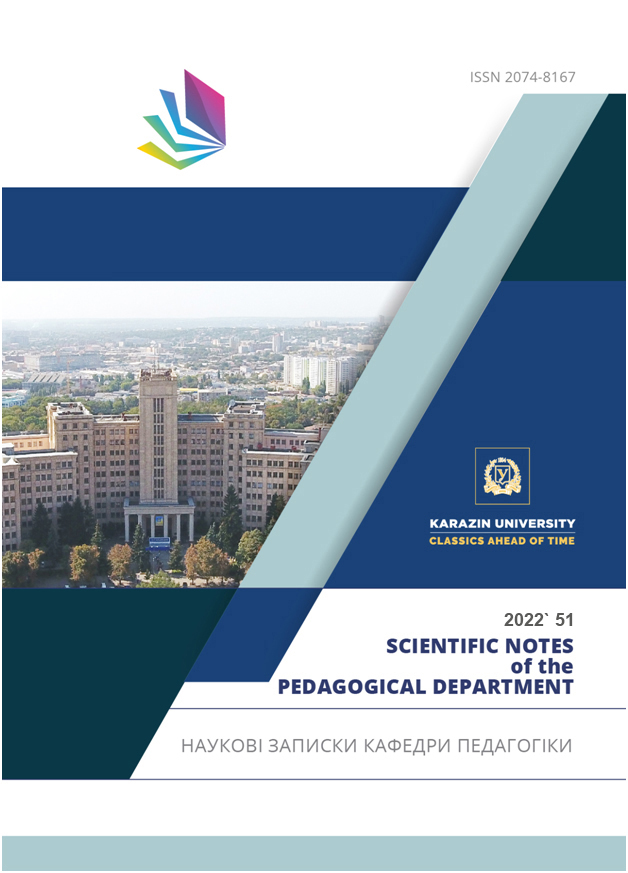Рівні освіти у Китайській Народній Республіці
Анотація
Стрімкий розвиток економічного потенціалу КНР викликає великий інтерес до вивчення освітньої системи цієї країни. Освіта це основа, будь якого, економічного та соціального зростання і щоб зрозуміти ці процеси потрібно чітко розуміти рівні підготовки здобувачів на всіх етапах освіти. Мета дослідження полягає у аналізі та визначенні рівнів освіти у КНР. Методи дослідження складалися з: теоретичних методів дослідження: аналізу довідкової, нормативно-правової, психолого-педагогічноı ̈ та навчально-методичноı ̈ літератури та узагальнення цих даних відповідно до мети дослідження. У ході дослідження було визначено, що система формальної освіти у КНР включає ряд рівнів таких як шкільний з розподілом на 3 ланки, потім є рівень університетської освіти який ділиться на дві ланки бакалавр та магістр і ще існує рівень аспірантури/докторантури. Окремо потрібно виділити професійні коледжі та спеціалізовані коледжі які направлені на підготовку фахівців у різних сферах народного господарства. Тобто ми бачимо дуже схожу з українською систему рівнів освіти, що значно спрощує сприймання та адаптацію здобувачів які приїздять на навчання до КНР і навпаки. Окремо потрібно сказати про роки навчання у вищій школі, де існують деякі відмінності у ланці магістратури та аспірантури, де на них відводиться до 4 років, що відрізняється від українського варіанту максимум 1.8. роки у магістратурі і 4 і 2 у аспірантурі та докторантурі.
Завантаження
Посилання
/Посилання
Brandenburg U. & Zhu Jia-ni. Higher education in China. 2007. URL: http://www.che.de
CERNET. URL: http://www.edu.cn/20010101/21778.shtml
Education China. Education China 2007. URL: http://www.edu.cn/20041203/3123354.shtml
Finnish National Board of Education 2007: Finnish National Board of Education: Higher Education in the People’s Republic of China; http://www.edu.fi/julkaisut/chinaedu.pdf, last retrieval April 22, 2007
MoE. Ministry of Education report for 2005. 2005. URL: http://www.moe.edu.cn/edoas/website18/info15425.htm
Mohrman K. Higher Education Reform in Mainland Chinese universities: An American’s Perspective, Chinese University Hongkong 2003. URL: http://www.saisjhu.edu/Nanjing/downloads/Higher_Ed_in_China.pdf.
Nanzhao, Z., Muju, Z., Baohua, Y., Xia, G., Wenjing, W., & Li, Z. (2007). Educational reform and curriculum change in China: A comparative case study. International Bureau of education. URL: http://www.ibe.unesco.org/ fileadmin/user_upload/COPs/Pages_documents/Comparative_Research/EduReformChina.pdf
Netherlands Education Support Office Beijing 2005. Netherlands Education Support Office Beijing: Perceptions of European higher education in third countries. A study carried out by the Academic Cooperation Association. China Country Report, prepared for Academic Cooperation Association, Brussels 2005.
Song H. Sleeping giant: Chinese Teacher Education System Past, Present and Future. 2008. URL: http://search. proquest.com/docview/214626657/75080B414B4A40B9PQ/3?accountid=8554
Su Z.X., Hawkins J., Huang T. & Zhao Z.Y. Choices and commitment: Acomparison of teacher candidates& profiles and perspectives in China and the United States. International Revieiv of Education. 2001. 47(6). P. 611-63
Yan H. Teacher training in China and a practical model: e-Training Community (eTC). Campus-Wide Information Systems. 2009. 26(2). P. 114-121.https://doi.org/10.1108/10650740910946837
Young E. E., Grant P. A., Montbriand C., & Therriault D. J. Educating Preservice Teachers: The State of Affairs. 2002. North central regional Educational laboratory: Illinois.
Zhou J. Teacher education changes in China: 1974–2014. Journal of Education for Teaching. 2014. 40(5). P. 507- 523
Zhou N. & Zhu M. Educational Reform and Curriculum Change in China: A Comparative Case Study. 2007. URL: http://www.ibe.unesco.org/fileadmin/user_upload/COPs/Pages_documents/Comparative_Research/ EduReformChina.pdf
Zhou Z.Y. The teaching profession: To be or to do? Journal of Education for Teaching. 2002. 28. P. 211-215.
Zhu X. & Cilin L Teacher training for moral education in China. Journal of Moral Education. 2004. 33(4). P. 481-494. https://doi.org/10.1080/0305724042000315608
Zhu X. & Han X. (2006). Reconstruction of the Teacher Education System in China. International education journal. 7(1). P. 66-73.
Brandenburg U. & Zhu Jia-ni. Higher education in China. 2007. URL: http://www.che.de
CERNET. URL: http://www.edu.cn/20010101/21778.shtml
Education China. Education China 2007. URL: http://www.edu.cn/20041203/3123354.shtml
Finnish National Board of Education 2007: Finnish National Board of Education: Higher Education in the People’s Republic of China; http://www.edu.fi/julkaisut/chinaedu.pdf, last retrieval April 22, 2007
MoE. Ministry of Education report for 2005. 2005. URL: http://www.moe.edu.cn/edoas/website18/info15425.htm
Mohrman K. Higher Education Reform in Mainland Chinese universities: An American’s Perspective, Chinese University Hongkong 2003. URL: http://www.saisjhu.edu/Nanjing/downloads/Higher_Ed_in_China.pdf.
Nanzhao, Z., Muju, Z., Baohua, Y., Xia, G., Wenjing, W., & Li, Z. (2007). Educational reform and curriculum change in China: A comparative case study. International Bureau of education. URL: http://www.ibe.unesco.org/ fileadmin/user_upload/COPs/Pages_documents/Comparative_Research/EduReformChina.pdf
Netherlands Education Support Office Beijing 2005. Netherlands Education Support Office Beijing: Perceptions of European higher education in third countries. A study carried out by the Academic Cooperation Association. China Country Report, prepared for Academic Cooperation Association, Brussels 2005.
Song H. Sleeping giant: Chinese Teacher Education System Past, Present and Future. 2008. URL: http://search. proquest.com/docview/214626657/75080B414B4A40B9PQ/3?accountid=8554
Su Z.X., Hawkins J., Huang T. & Zhao Z.Y. Choices and commitment: Acomparison of teacher candidates& profiles and perspectives in China and the United States. International Revieiv of Education. 2001. 47(6). P. 611-63
Yan H. Teacher training in China and a practical model: e-Training Community (eTC). Campus-Wide Information Systems. 2009. 26(2). P. 114-121.https://doi.org/10.1108/10650740910946837
Young E. E., Grant P. A., Montbriand C., & Therriault D. J. Educating Preservice Teachers: The State of Affairs. 2002. North central regional Educational laboratory: Illinois.
Zhou J. Teacher education changes in China: 1974–2014. Journal of Education for Teaching. 2014. 40(5). P. 507- 523
Zhou N. & Zhu M. Educational Reform and Curriculum Change in China: A Comparative Case Study. 2007. URL: http://www.ibe.unesco.org/fileadmin/user_upload/COPs/Pages_documents/Comparative_Research/ EduReformChina.pdf
Zhou Z.Y. The teaching profession: To be or to do? Journal of Education for Teaching. 2002. 28. P. 211-215.
Zhu X. & Cilin L Teacher training for moral education in China. Journal of Moral Education. 2004. 33(4). P. 481-494. https://doi.org/10.1080/0305724042000315608
Zhu X. & Han X. (2006). Reconstruction of the Teacher Education System in China. International education journal. 7(1). P. 66-73.
Цитування
Education in China: Challenges and Prospects of the XXI Century
Nalyvaiko Oleksii & Nalyvaiko Natalya (2024) Educological discourse
Crossref

